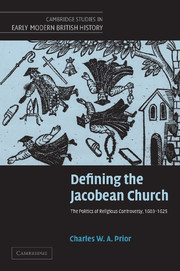Book contents
- Frontmatter
- Contents
- Acknowledgements
- Note on the text
- 1 Introduction: defining the Church
- 2 The language of ecclesiastical polity and Jacobean conformist thought
- 3 Doctrine, law, and conflict over the Canons of 1604
- 4 Apostoli, episcopi, divini?: models of ecclesiastical governance
- 5 Bellum ceremoniale: scripture, custom, and ceremonial practice
- 6 Ceremonies, episcopacy, and the Scottish Kirk
- 7 Conclusion: narratives of civil and ecclesiastical authority
- Bibliography
- Index
- Titles in the series
3 - Doctrine, law, and conflict over the Canons of 1604
Published online by Cambridge University Press: 09 July 2009
- Frontmatter
- Contents
- Acknowledgements
- Note on the text
- 1 Introduction: defining the Church
- 2 The language of ecclesiastical polity and Jacobean conformist thought
- 3 Doctrine, law, and conflict over the Canons of 1604
- 4 Apostoli, episcopi, divini?: models of ecclesiastical governance
- 5 Bellum ceremoniale: scripture, custom, and ceremonial practice
- 6 Ceremonies, episcopacy, and the Scottish Kirk
- 7 Conclusion: narratives of civil and ecclesiastical authority
- Bibliography
- Index
- Titles in the series
Summary
Immediately before and after the Hampton Court conference, English Protestants debated how the Church should be ordered, and while conformists advanced the arguments discussed in the previous chapter, their opponents offered an alternative definition of the Church as a purely spiritual association, patterned on scripture and confirmed in the writings of approved Fathers of the Church. It was this proposition that led them, in turn, to attack the programme of clerical subscription that followed Hampton Court. Subscription, the argument ran, was a political means to enforce a spiritual end; it was a policy of human devising, carried out by bishops whose offices themselves had no scriptural warrant; the imperative of civil order was being promoted at the cost of the purity of doctrine, and this moved the Church away from its proper form. Against these claims, conformists advanced arguments that emphasised the freedom of the Church, under the Crown, to regulate governance, worship, doctrine, and discipline, and situated the case within Apostolic and common law interpretations of history. In short, the debate was a continuation of the theme, examined in the previous chapter, of the compatibility of the historical narratives that testified to the relationship between civil and ecclesiastical authority.
This chapter examines the tension between doctrinal and legal conceptions of the Church of England, and situates them within the larger question of the nature of authority over the Church.
- Type
- Chapter
- Information
- Defining the Jacobean ChurchThe Politics of Religious Controversy, 1603–1625, pp. 65 - 112Publisher: Cambridge University PressPrint publication year: 2005



